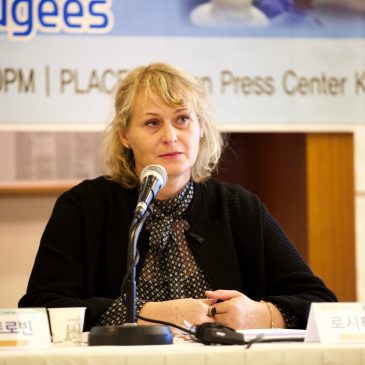Religious Persecution, Refugees, and Right of Asylum
Rosita Šorytė Introduction The tragedy of World War II generated an unprecedented number of refugees in Europe. To confront this situation, the United Nations created in 1950 the office of the United Nations High Commissioner for Refugees (UNHCR). His work with the European emergency was generally regarded as successful, and UNHCR was awarded the Nobel Peace Prize in 1954. UNHCR also asked the United Nations to establish clear international law provisions regarding refugees. On July 28, 1951, the United Nations Conference of Plenipotentiaries on the Status of Refugees and Stateless Persons, convened in Geneva, Switzerland, under General Assembly resolution 429 (V) of 14 December 1950, and adopted the Convention Relating to the Status of Refugees, known as the 1951 Refugee Convention. Although some counties distinguish between “asylum seekers” and “refugees,” in the 1951 Convention a refugee is simply an asylum seeker whose application has been accepted. To this day, UNHCR regards this convention as “the key legal document that forms the basis of our work” (UNHCR 2017). It was signed and ratified by both China (in 1982) and South Korea (in 1992). However, the 1951 Convention was custom-tailored to solving the problem of post-war refugees in Europe, and some provisions were limited to them. For this reason, a broader document was signed in New York in 1967, the Protocol Relating to the Status of Refugees. The United States, which were afraid of receiving too many refugees after World War II, had not signed the 1951 Refugee Convention but did sign and ratify the 1967 Protocol. Some 40 countries remain outside the Convention-Protocol system, including Jamaica, Nigeria, Saudi Arabia and the Gulf States, India, Pakistan, Indonesia, Thailand, Vietnam, Mongolia, and Malaysia—as well as North Korea (although perhaps not many refugees would seek asylum there…). However, China and South Korea signed and ratified the Protocol. For the definition of refugee, Article 1 of the Protocol refers to Article 1 of the 1951 Convention, which mentions “any person who, owing to well-founded fear of being persecuted for reasons of race, religion, nationality, or political opinion, is outside the country of his nationality and is unable or, owing to such fear or for reasons other than personal convenience, is unwilling to avail himself of the protection of that country or for reasons other than personal convenience, is unwilling to return to it.”. =The Universal Declaration of Human Rights, Art. 14, already established that: “Everyone … Continued

